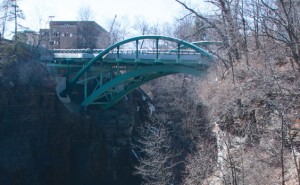Last Wednesday, the City of Ithaca’s Common Council approved 7-2 a motion by Cornell University to build nets aimed at preventing more suicides under three city-owned bridges.

The suicide nets are part of a multi-pronged approach by the university to address troubled students in light of the multiple suicides over the past two decades, which include six deaths during the 2009-10 academic year. Three of those deaths occurred in March alone. The nets are replacing fences that were put on the bridges before.
The university, which agreed in September to cover the $6-10 million cost of the installation as well as insurance and maintenance, is set to construct the nets for three bridges on Thurston Avenue and Stewart Avenue this summer. Last month, Cornell won approval from a sight plan committee to construct nets on university bridges.
Timothy Marchell, director of mental health initiatives at Cornell, said the nets are a single but vital part of a comprehensive initiative to stop suicides. He said physical impediments to committing suicide, known as “means restriction,” are an effective way to prevent more tragedies in the future.
“Because of the ready availability of this highly lethal means of suicide, it’s important to take steps to make it physically difficult to jump from these areas,” Marchell said.
Cornell based its support for means restriction on a study of net installation under bridges in Bern, Switzerland, which found that increased media coverage of suicide attracted more troubled individuals to kill themselves at the site, and that physical barriers significantly reduced instances of suicide in the immediate years after installation.
“Means restriction is really about creating physical barriers to slow down the process by which someone might attempt to take their own life,” Marchell said. “In Ithaca, given our unique topography, means restriction on bridges is an important part of our approach.”
Cornell’s suicide rate falls roughly into the national annual average of university populations, which is about two per 20,000 students. Marchell said nearly half of the suicides over the past 20 years have been committed by bridge-jumping. Because this type of suicide is public, it garners negative media attention to the bridges and tags them as suicide “hot spots,” according to a study published by the American Association of Suicidology.
Andrew Magre, associate university architect, said the school settled on horizontal net installation after hiring NADAAA, a Boston-based design consultant firm, to go over all options.
“The benefits of the net systems are that they are effective, and they don’t block views from the bridge decks looking out over the beautiful landscapes,” Magre said.
In addition to reducing suicides via gorge jumping, the university has also taken steps to address student mental health.
In 2007, the university created a team that meets weekly to discuss students observed by police and administrators to be struggling.
Ellen McCollister, an alderwoman who represents the 3rd Ward of Ithaca on the Common Council, voted against the measure and said installing the nets does not address the root causes of suicide. She disputed the idea that coverage of Cornell suicides would lead others to take the same action.
She said the proposal of suicide nets is just a “knee-jerk” response to bad publicity.
“If you look at the issue of symptom versus root cause there will always be a few people who commit a compulsive suicide, but suicide is a much more complicated mental health problem than that,” she said.
George McGonigal, an alderman who represents the 1st Ward of Ithaca, said the resolution got his support because of Cornell’s willingness to cover costs, but also because of community reaction to the proposal.
“People from throughout the community lobbied in favor of it,” McGonigal said. “This included the mental health community, private citizens, leaders of the hospitals, the local fire department, which was very significant in my vote because these are the people who have to go down into the gorges to rescue people or to recover people in all kinds of weather in all times of the year.”
McGonigal said the nets are an experiment, and the only thing to do is wait and see whether they are effective.
“We won’t know until they’re installed and time passes and at the end of 10 years the city can change its mind if they so choose,” he said.







